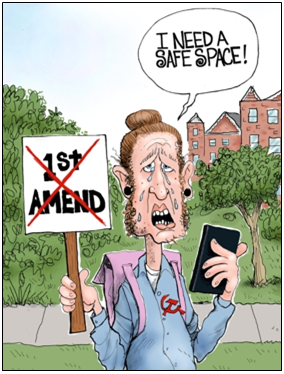Immediately upon entering adulthood, students are forced to make the largest decision of their adult life, barely 18-year-old students must decide the higher education institute of their choice, or if they want to go at all. Common considerations include cost, location, and notoriety, but for many a key consideration is far less obvious — the politics of individual schools.
While many colleges tout open-mindedness and diversity, this is done on a superficial level, where diversity is defined by characteristics of race, socioeconomic status, and language. To clarify, these are extremely important margins for ensuring an inclusive educational environment, but what about intellectual diversity?
Often colleges neglect the ideological barriers they themselves are creating. For conservative students, these forms of isolation and lack of opportunity are common.
Harvard University’s own Crimson newspaper embarrassingly had to explain in an Oct. 2015 report, “The Elephant in the Room: Conservatives at Harvard,” that conservative students on campus often feel overwhelmed by the liberal presence of students and faculty. This isolation prevents students from working on political campaigns and silences students in classrooms.
But the effects are significantly more far reaching than this. Self-identifying conservative students are less likely than ever to attend ivy league schools due to the schools’ liberal bias. The American Conservative’s Rod Dreher in the July 2014 piece, “To Hell With Ivy League Schools” tells the story of students who attend years of ivy league college and never understand the deeper value of their experience, because their positions have drove them into silence. One student explains upon visiting an ivy league campus, he realized students were not openly discussing issues and finding common ground as hoped, but instead only reestablishing and pressuring views he did not agree with, fear of alienation pushed him to decide on a school far less notable but significantly more depoliticized.
As conservative students refrain from the elite class of colleges or select schools with less political leaning, the voices of conservatives in academia are consistently silenced. While the easy attack is to say that these students are letting their own fears prevent their success, the reality is much more impactful.
The conservative Leadership Institute tells stories of students given zeros on assignments consistently because they refused to write papers questioning their religious and political views. Or, of students who openly espoused conservative views in classrooms had professors ignore their input or allow a team of liberal students to attack their views-not constructively but oppressively. Fear does not simply come from isolation by other students, but getting bad grades due to political beliefs.
The problem stems from a confusion of open mindedness being inherently linked to contemporary liberal ideals, a fiction that educators often perpetuate. As professor emeritus at State University of New York at New Paltz Mark Sherman elucidated in March 2011 Psychology Today piece, “Does liberal truly mean open-minded?” the common problem with associating “liberal” with “inclusive” is that it immediately discredits the opportunity for conservatives to be seen as inclusive as well, silencing their philosophy as wrong.
Sherman wrote, “if you are a strong believer in both science and social change, it is more than reasonable to be a liberal. But to a good academic, the science — data evidence, and, when possible, experimentation — should come first.” Sherman explained that for liberal professors, such as himself, in an academic setting there is a necessity to provide balance for students.
As the university system pushes for an “open” and “inclusive” campus, but only defines this in a liberal context, they achieve the exact opposite — a campus which isolates and rejects those who do not conform to the liberal mindset. Sherman provides a positive example of how educators can rise above that bias.
Professors take an active role in perpetuating this stigma by pushing conservative students into a singular characteristic, while giving liberal students many points of identification. While liberal students can be seen as “activists” for an array of causes and issues and often have clubs on campus which represent the span of these advocacies, conservatives are limited to having a “Young Republicans Club” and experience strong push back from professors, students, and the university system when an attempt is made to expand past this. Essentially, conservative students are allowed to advocate for one “wrong” view, usually accused as racist and classist, while liberal students can advocate for a range of views, seen as inclusive and scholarly.
A lack of accountability in universities toward professors and school administrators discriminating against conservative students is having a direct impact on educational success and the environment within campuses. By neglecting the position of conservative students, universities are effectively silencing student ideas and preventing their development, the exact opposite of the goals of education and academic inquiry.
Being a conservative should not mean your educational advancement is less significant, and luckily some institutions do work to counter this by supporting conservative clubs, focusing on variety in course options, and hosting events which open the door for political participation. My own university has held student forums and invited presidential candidates to campus from both sides of the aisle; the opportunity for dialogue unites students by allowing students to share viewpoints and gain understanding.
Similarly, these forums force professors to discuss political theory in the context of both conservative and liberal views, because they are unavoidably close to campus. However, despite some clear successes, the compulsory liberalization of the educational system seems to have created the perception that conservatives on campus are less meaningful. Sadly, this impression only silences the goal of open communication in academia, rather than promoting it.
Natalia Castro is a contributing editor at Americans for Limited Government, and a student at George Mason University.







